
Vlad Yudkin
16 April, 2024
Real Estate SEO
Here you will find out what SEO for real estate is and how it can boost your leads.

What is SEO in Real Estate?
Search engine optimization is all about strategically labeling, organizing, and presenting information across your website's pages. This optimization aims to enhance search engines' comprehension of your website's content and purpose. You may find yourself asking, what does SEO mean in real estate specifically?
Real estate search engine optimization employs a series of methods designed to enhance the visibility of your real estate website on SERPs. This helps prospective homebuyers and sellers find your website.
Enhancing your SEO strategy entails concentrating on localized search queries for more precise outcomes, optimizing the backend of your site to ensure vital information is accessible to search engines, and comprehending the needs of potential clients.
Some key statistics about SEO:
- SEO leads boast a close rate of 14.6%, contrasting sharply with the 1.7% close rate for outbound leads (e.g. print advertising or direct mails).
- A staggering 76% of individuals searching for nearby businesses on their smartphones visit a related establishment within a day. Furthermore, 28% of these searches culminate in a purchase.
- In the United States alone, the SEO industry commands a substantial worth exceeding $80 billion.
Why is SEO for Real Estate Website So Important?
Nearly 99% of homebuyers aged 23 to 56 utilize the internet in their home-buying journey. This underscores the importance of maintaining an online presence, as it ensures visibility to potential clients actively searching for their next home. And the best way to improve your presence is SEO.
It aims to drive organic, good quality traffic. You might believe that paid advertisements are superior, but let us demonstrate the costs per click:
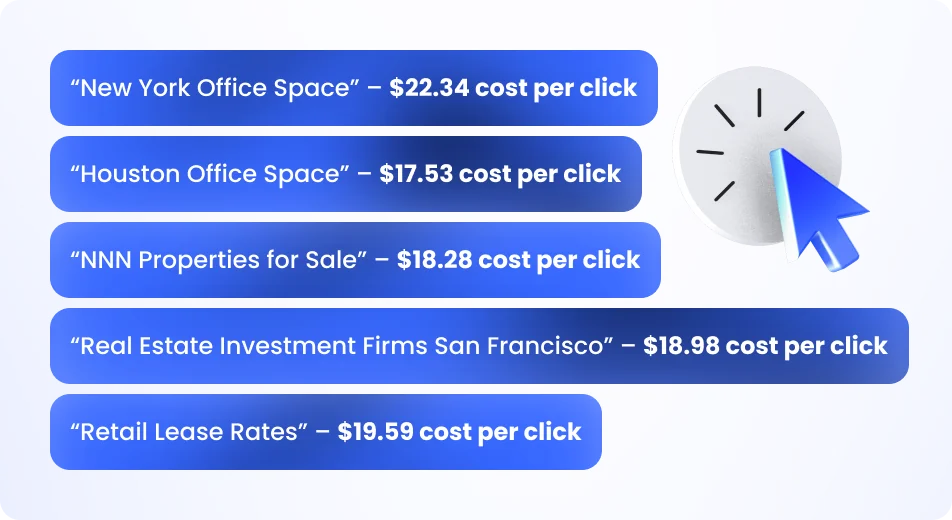
This isn’t sustainable for most real estate websites. And those who can afford it don’t really need it. This is why SEO with a good marketing strategy is so important.
Benefits of SEO for Real Estate Agents, Agencies and Their Websites
SEO isn't a swift solution or a single-shot tactic; rather, it demands consistent, sustained attention. Although it necessitates initial dedication and ongoing commitment, the eventual rewards far outweigh the effort. Here are some key benefits you can gain:
- Enhanced Brand Visibility. By optimizing your real estate website for search engines, you increase the likelihood of appearing in relevant results. This heightened visibility exposes your brand to a wider audience of potential homebuyers and sellers. Consistent appearance in search results establishes your brand's authority and trustworthiness within the real estate market, fostering stronger connections with prospective clients.
- Reduced Dependency on Paid Channels. Real Estate SEO allows you to decrease reliance on paid advertising channels, such as pay-per-click (PPC) campaigns and improve your marketing strategy. While paid channels can provide immediate results, they often require ongoing investment. With effective strategies in place, your site can organically attract traffic and leads over time, reducing the need for continuous spending on advertising. This not only saves costs but also ensures a sustainable and long-term approach to attracting clients.
- Augmented Traffic and Revenue Generation. Implementing SEO tactics tailored to the real estate industry can significantly boost site traffic and, consequently, revenue generation. By targeting relevant keywords and optimizing your content, you increase the chances of attracting qualified leads actively searching for properties or real estate services. Higher traffic translates into more inquiries, conversions, and ultimately, increased revenue for your real estate business.
- SEO Operates Continuously. Unlike traditional marketing efforts that have finite durations or specific campaign periods, Real Estate SEO operates continuously. Once implemented, SEO strategies continue to work in the background, improving your rankings over time. This "always-on" nature ensures a consistent flow of organic traffic, allowing you to maintain a competitive edge in the ever-evolving real estate market without the need for constant manual intervention.
In summary, SEO represents a long-term investment that undoubtedly yields significant returns.
Look at those statistics from National Association of Realtor. Here we can see that more than 52% buyers found their property on the internet.
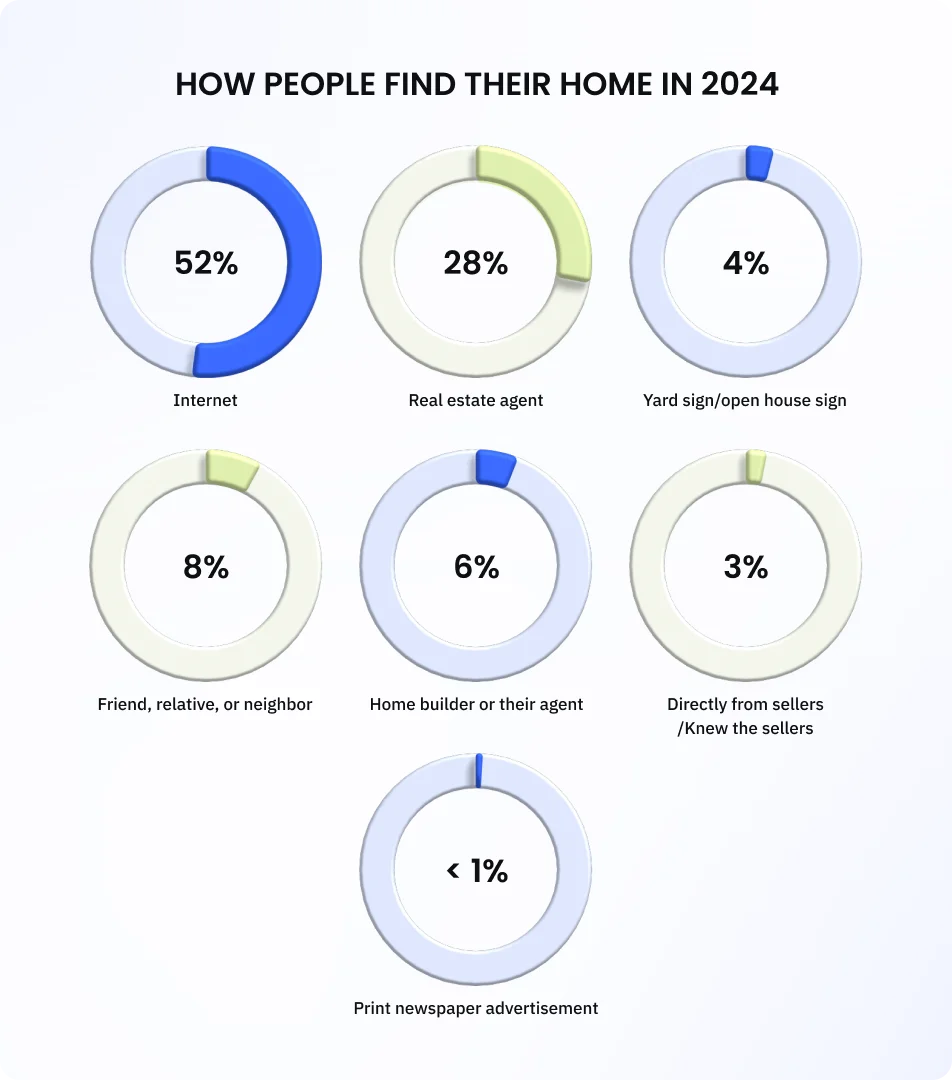
4 Mistakes from Old SEO Strategies
To gain desired traffic, having a good understanding of real estate is crucial. In today's digital landscape, Google prioritizes providing users with content that is both relevant and valuable. The days when manipulating search engines could easily propel your site to the top of the rankings are gone.
- Here are some mistakes you should always avoid:
- Publishing thin or subpar content that lacks depth or usefulness. Even worse if you copy content from other websites.
- Overloading your content with excessive keywords (keyword stuffing).
- Attempting to manipulate search engine algorithms by generating fake traffic.
- Engaging in low-quality link building on spammy services.
Some of these methods used to work before. But now this is a straight road to Google blocking you in the rankings.
Real Estate SEO Tips to Improve Your Rankings
So, where should I start? That's a great question! Here, we've gathered all the best tips to boost your real estate company.
Start With SEO Audit
This involves regularly assessing your website's performance. Comprehensive audits should be conducted at least twice a year. The insights gained from these audits provide a roadmap for improving your real estate website's rankings.
During an SEO audit you will find out what to improve:
- Technical SEO.
- Local SEO.
- Competition.
- Off-page and On-page SEO.
- Content.
Let’s dig into all these aspects in detail.
First of All: Keyword Research
A proper keyword research stands as the initial and most important phase in enhancing your real estate SEO and marketing strategy. It commences with grasping the frequency of buyer searches for particular terms, gauging the level of competition from other companies for those terms, and considering additional influencing factors.
Keywords are categorized based on intent:
- Commercial: Indicates a desire to make a purchase.
- Informational: Reflects a quest for knowledge.
- Navigational: Signals an intention to navigate to a specific location.
- Investigation: Implies a need to compare two options.
You need to decide what exactly you want to rank for. A straightforward method for conducting keyword research is to examine who currently dominates the search engine rankings in your region. Essentially, Google is already providing ideas of what are its preferences and expectations.
Some very common keywords can also be very competitive. When you incorporate more precise search terms or aim for more difficult long-tail keywords, like "homes for sale in Chicago, IL" or "3-bedroom homes for sale in Los Angeles with pool" your website's ranking may improve if Google considers it the most relevant answer to the searcher's query. These long keywords often have lower competition levels, making it easier for real estate agents to rank higher.
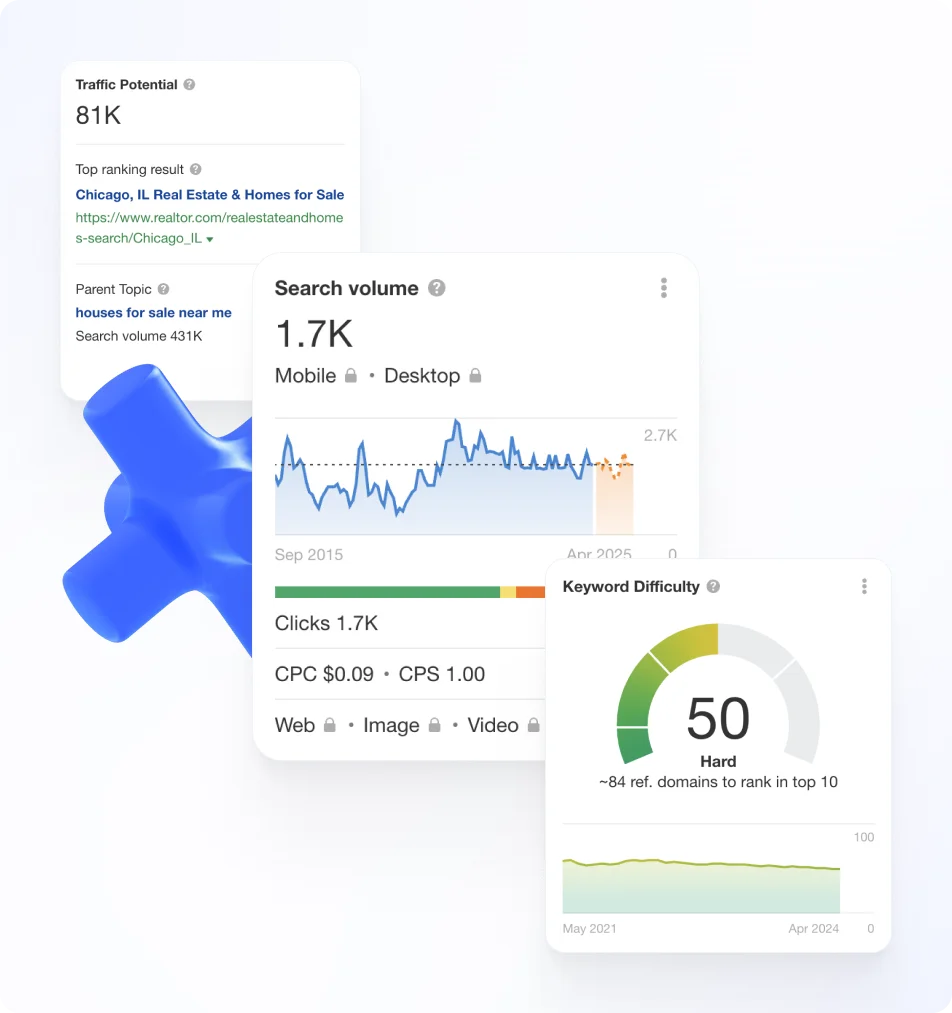
The keywords you picked should be strategically incorporated across various elements of your website to optimize its visibility in Google results. These include headings, titles, meta descriptions, URL structures, body content, image alt text, internal links, anchor text, blog post titles, and even social media posts. By strategically placing keywords in these areas, you can enhance your website's relevance and authority in the eyes of Google and others.
Optimize Your Website and Make it Load Faster
Here we will be talking about technical SEO. Many real estate websites prioritize images, often resulting in a high volume of visuals. However, an excessive number of high-quality images can lead to site slowdowns. Consequently, a slow-loading website with subpar quality detracts from the user experience (UX). This is why you should optimize your images.
Improvements also include:
- Submitting your complete sitemap to Google.
- Creating a logical hierarchy for an SEO-friendly structure, facilitating easy indexing.
- Ensuring correct schema markup implementation.
- Addressing response codes such as 503, 401, 404, 410, and 505.
- Reviewing website structure, orphan pages, and internal linking for optimization.
- Identifying and resolving duplicate URLs and content issues.
- Setting up XML sitemaps and robots.txt file for improved search engine accessibility.
- Verifying web security through SSL certification.
- Addressing negative SEO by identifying and disavowing harmful backlinks pointing to your website.
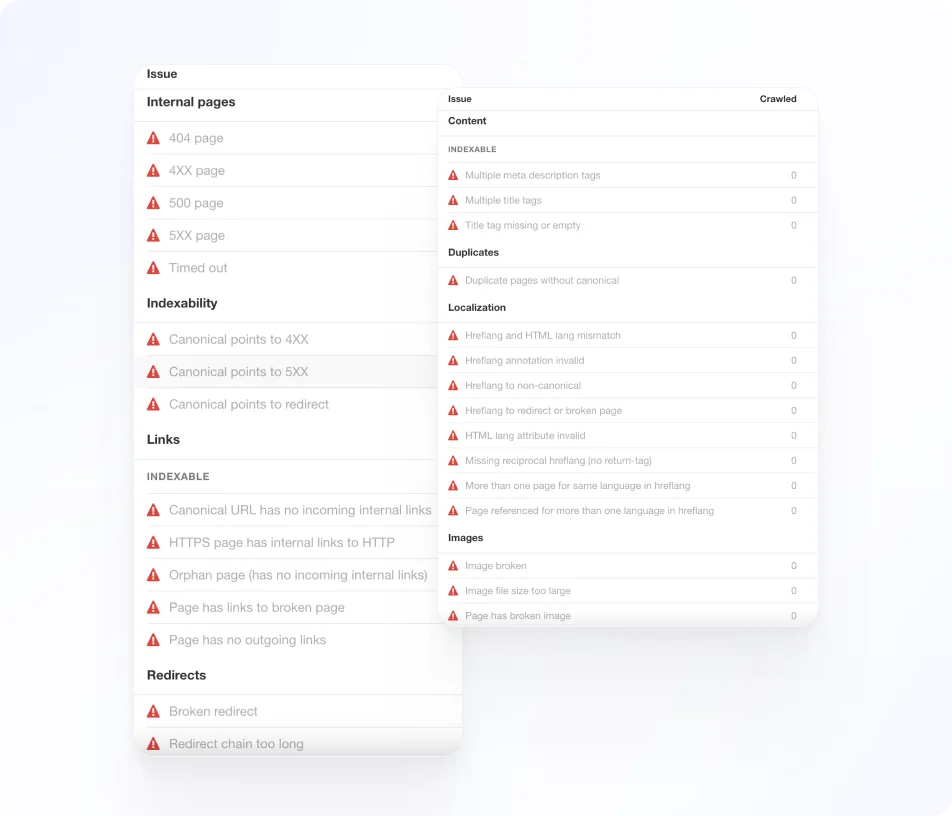
Is your website failing to meet your expectations?
Don't worry, we've got you covered.Improve On-Page and Off-Page SEO
On-Page SEO involves fine-tuning individual web pages to enhance their search engine rankings and draw in greater organic traffic. This optimization encompasses refining content, images, headings, meta tags, and other on-page elements to make them more relevant and accessible to users and Google. There is a lot to it, but here is a brief list of things you should do:
- Optimize meta descriptions, headings, and page titles with the keywords you have researched before. Interesting fact: 43% of individuals click on a specific search result purely based on the meta description.
- Create high-quality, engaging, and relevant content that satisfies user intent.
- Use URLs that are descriptive and keyword-rich.
- Optimize images with descriptive image names and add appropriate alt text.
- Ensure fast loading times by optimizing page speed.
- Use internal linking to connect related content within your website.
- Incorporate schema markup.
- Make sure your pages are mobile-friendly and responsive.
- Improve user experience by organizing content logically and making it easy to navigate.
- Regularly update and refresh content to keep it relevant and up-to-date.
This is what Google relies on:
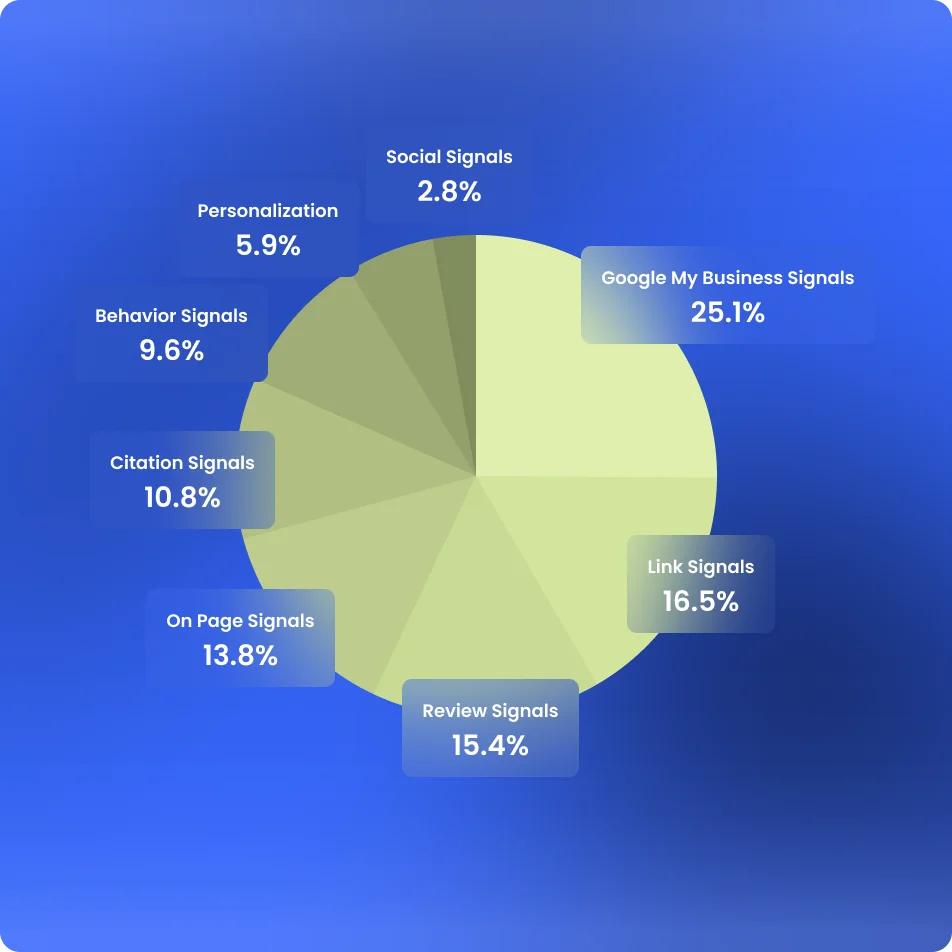
Off-Page SEO is all about optimizing factors external to your website to enhance rankings and authority. This includes activities such as link building, social media engagement, and online mentions from other services. Off-Page SEO aims to boost your website's credibility, relevance, and visibility across the web, ultimately driving a good amount of organic traffic and improving its standing in SERPs.
Let's delve into the critical details of both on-page and off-page SEO.
Optimize for Mobile Devices
Begin by implementing a responsive website design that adapts to your visitors' devices. Responsive design not only enhances user experience but also minimizes the likelihood of visitors encountering error pages or unreadable content.
Content on Your Website
Content holds immense significance as it facilitates the acquisition of backlinks. Utilizing a blog provides an effective platform for publishing content. According to Hubspot's customer data, companies maintaining a blog experience a 434% increase in search engine-indexed pages and attract 55% more visitors compared to those without a blog.
Location holds paramount importance in real estate SEO and marketing. When individuals embark on their real estate journey, they frequently turn to online platforms to gather information about specific locations. Information on school districts, neighborhoods, crime statistics, access to public transportation, employment opportunities, and the overall community vibe are all important criteria.
Therefore, it's crucial to curate informative content tailored to your location to meet the needs of these potential buyers and sellers. By focusing on location-centric content, you can serve your audience and establish yourself as an authoritative source within your target areas.
Use Social Media
The utilization of social media platforms like Facebook, Instagram, and LinkedIn has become ubiquitous in the real estate industry. Nearly all real estate professionals utilize Facebook, while approximately 50% also leverage Instagram and LinkedIn.
Given the widespread use of these platforms, it's essential for real estate agents to actively post content on social media. Whether it's commercial listings, informative articles, or engaging visuals, maintaining a consistent presence on social media will allow you to reach a broader audience, establish credibility, and foster meaningful connections with potential buyers and sellers.
You can post a variety of content on social media platforms to engage with your audience and showcase expertise. Here are some ideas:
- Property Listings. Share listings of available properties with attractive photos and detailed descriptions.
- Virtual Tours. Post virtual tours or videos showcasing properties to give followers a feel for the space.
- Market Updates. Share insights and updates about the local real estate marketing, including trends, statistics, and forecasts.
- Neighborhood Spotlights. Highlight different neighborhoods or communities, showcasing amenities, schools, parks, and local attractions.
- Home Buying and Selling Tips. Provide valuable tips and advice for buyers and sellers, such as staging tips, negotiation strategies, or mortgage advice.
- Educational Content. Share informative articles, infographics, or videos about various aspects of the real estate process, such as home inspections, financing options, or legal considerations.
Further Improve Local SEO for Real Estate
We already talked about the most important Local SEO aspects for real estate marketing: keywords and content. To get the most from Local SEO, you should also strongly consider implementing the following:
- Optimizing GMB profile (Google My Business). Claiming and optimizing your GMB profile with accurate business information, including your address, phone number, and hours of operation. This helps your business appear in local map listings and the "Local Pack" of search results.
- NAP consistency. Ensuring consistency in your address, business name, phone number (NAP) across all online platforms, including your website, GMB profile, and local directories.
- Building local citations. Obtaining citations (mentions of your NAP) from authoritative local directories to boost your website's credibility and authority in search results of your location.
- Obtaining reviews. Encouraging satisfied clients to leave positive reviews on platforms like Google My Business, Yelp, and Facebook. Positive reviews can improve your visibility and build trust with potential clients.
Backlinks
Google's algorithms have placed significant importance on backlinks as a determining factor for rankings. Each inbound link from another website serves as a testament to your authority, essentially acting as a vote of confidence.
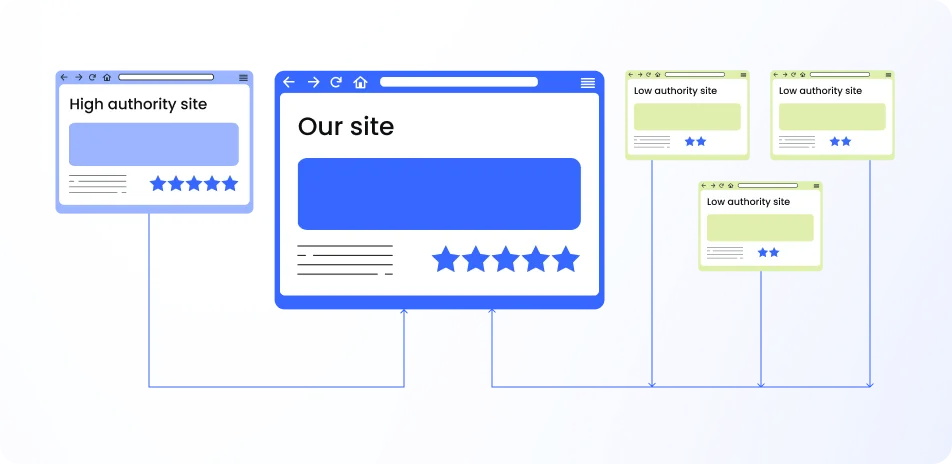
Crafting an effective backlink strategy holds paramount importance. Such a strategy serves as a catalyst in driving traffic to your real estate website from various external sources, thereby enhancing its visibility and credibility.
Here are the most efficient ways to get backlinks:
- High-Quality Content Creation. Producing valuable and engaging content that naturally attracts backlinks from other websites within your industry.
- Guest Blogging. Contributing guest posts to reputable websites and blogs in your field, which often allow you to include a link back to your site in the author bio or content.
- Online Directories and Listings. Submitting to authoritative and industry-specific online directories and listing sites.
- Social Media Profiles and Posts. Including links to your site in your social media profiles and posts, as well as actively engaging with your audience to encourage sharing and linking to your content.
Competitor Research
Competitor research is crucial for real estate SEO, as it provides valuable insights into the strategies and tactics that other players in the market are using to succeed. By analyzing competitors' SEO efforts, you can gain a deeper understanding of the competitive landscape, identify areas of opportunity, and refine own SEO strategy for real estate accordingly.
When conducting competitor research for real estate SEO, it's essential to look for several key factors:
- Identify the keywords and phrases that competitors are targeting in their content and metadata. This can help inform your own keyword strategy and uncover potential new keyword opportunities.
- Analyze the backlink profiles of competitors to understand where their inbound links are coming from and the quality of those links. This can help identify potential link-building opportunities for your own website.
- Evaluate the types of content that competitors are producing and the topics they are covering. Look for gaps or areas where you can differentiate your content to better meet the needs of your target audience.
- Review competitors' on-page optimization tactics. This can provide insights into best practices and areas for improvement on your own website.
- Assess how competitors are optimizing their websites for local search, including their Google My Business profiles, local citations, and content. This can help with your own search engine optimization and marketing strategy.
Ensure ADA Compliance for Your Website
With one in four Americans having a disability, ranging from mobility challenges to visual impairments, it's crucial to optimize pages accordingly. Assistive devices aid in achieving ADA compliance and also enhance search engine optimization. For instance:
- Utilize descriptive links instead of generic phrases like "click here" to provide users with clear expectations of linked content.
- Employ alt text for all images, aiding Google in understanding page content and improving visibility in Google Images.
- Implement accurate title and heading tags to assist users in identifying relevant pages effectively.
Track KPIs
How will you know that your SEO real estate strategy actually works? You need to track the KPIs:
- Organic Traffic. Monitor the number of visitors coming from organic search results.
- Keyword Rankings. Track the rankings of your target keywords in search engine results to gauge your website's performance and visibility.
- Conversion Rates. Measure the rate at which visitors convert into leads or customers. This could include inquiries, form submissions, or property inquiries.
- Click-Through Rate. Monitor the percentage of users who click on your website's link in search results compared to the total number of impressions. A higher CTR indicates that your titles and meta descriptions are effectively enticing users to click through to your site.
- Bounce Rate. Monitor the percentage of visitors who leave your website after viewing only one page. A high bounce rate may indicate that your website content or user experience needs improvement.
- Page Load Time. Track the time it takes for your web pages to load, as slow-loading pages can impact user experience in a negative way, leading to poor performance.
- Backlink Profile. Monitor the quantity and quality of backlinks pointing to your website, as backlinks are a key factor in search engine rankings.
- Local SEO Metrics. If targeting a specific geographic area, track all sorts of metrics such as search rankings for the desired location, Google My Business (GMB) insights, and local citation consistency.
- Authority Score. Measure of your website's authority and credibility, often provided by useful tools or calculated based on factors such as backlinks, content quality, and user engagement.
- Time Spent on Page. Average amount of time users spend on your pages, indicating engagement and interest in your content.
- Conversion Rate. Percentage of visitors who complete a desired action, such as filling out a form, subscribing to a newsletter, or making a purchase.
By tracking these KPIs, you can assess the effectiveness of your SEO efforts, identify areas for improvement, and optimize your strategies to drive more traffic, leads, and conversions.
Be Patient
SEO is not a one-time effort, but rather an ongoing process that requires patience and time to yield results.
Implementing a robust real estate search engine optimization strategy is essential, but it's equally crucial to understand that significant improvements won't happen overnight. It takes time for search engines to crawl and index your website, and even more time for your optimizations to impact rankings and organic traffic.
Therefore, the key is to implement a solid SEO strategy tailored to the unique needs of your real estate business and continuously refine it over time based on the insights and results you observe.
SEO Tools
There are many tools available to assist with various challenging SEO tasks. Below, we've compiled a list of particularly useful ones, along with brief descriptions of their capabilities:
- SEMrush. Offers competitive analysis, backlink analysis, and site audit features, among others.
- Ahrefs. Provides comprehensive analysis, including keyword research and other important things, such as backlink analysis, competitor analysis.
- Moz Pro. Offers tools for keyword research, rank tracking, link building, audits.
- Google Search Console. Gives insights into your performance in Google search results, including keyword rankings, click-through rates, and indexing issues.
- Google Analytics. Offers detailed traffic analysis, including information on user behavior, traffic sources, and conversions.
- Screaming Frog SEO Spider. Crawl your website to identify technical issues, such as broken links or harmful duplicate content.
- Yoast. This is a useful WordPress plugin that can help you optimize on-page elements.
- SpyFu. Offers competitor analysis, keyword research, and PPC insights.
- Majestic. Provides backlink analysis and domain authority metrics to help improve your overall performance.
- Serpstat. All about site audit, keyword research, rank tracking, and backlink analysis tools to help optimize your pages for search engines.
Conclusion
SEO in real estate plays a pivotal role in enhancing the online visibility and success of real estate businesses. By optimizing their websites, real estate professionals can attract more targeted traffic, generate quality leads, and ultimately increase their sales and revenue.
However, navigating the complexities of real estate SEO can be extremely daunting for many, which is why seeking the expertise of a specialized agency can be invaluable. With the assistance of our agency, real estate professionals can leverage proven strategies, industry insights, and tailored solutions to unlock the full potential of their online presence and stay ahead in today's competitive market.
Faq
What is SEO in real estate?
SEO in real estate refers to a comprehensive set of strategies and techniques aimed at improving a real estate website's visibility, rankings, and performance in SERPs. It encompasses various actions and optimizations, including keyword research, on-page optimization, good content creation, creating reliable backlinks, local SEO efforts, and technical optimizations. These actions are aimed at enhancing the website's relevance, authority, and user experience to gain more traffic, increase conversions, and generate leads for real estate professionals.
What specific criteria does Google consider when determining which websites will rank on the first page for a given search term and which will not?
Google's ranking algorithm considers numerous factors to determine which sites deserve to rank on the first page for a given search term. Some key factors include the relevance of the content to the search query, the quality, and authority of the website, the user experience provided by the site, the presence of relevant keywords, the website's loading speed, the number and quality of backlinks pointing to the site, and the overall trustworthiness of the website. Google strives to deliver users the most pertinent and top-quality search outcomes.
Is SEO for realtors significantly different from SEO for estate agents?
While there are similarities, SEO strategies for realtors and real estate agents can vary based on their specific goals, target audiences, and areas of specialization. However, both aim to improve online visibility and attract as many potential clients as possible and drive more leads through organic search. The nuances lie in tailoring SEO tactics to suit the unique needs and preferences of each professional's market and clientele.





